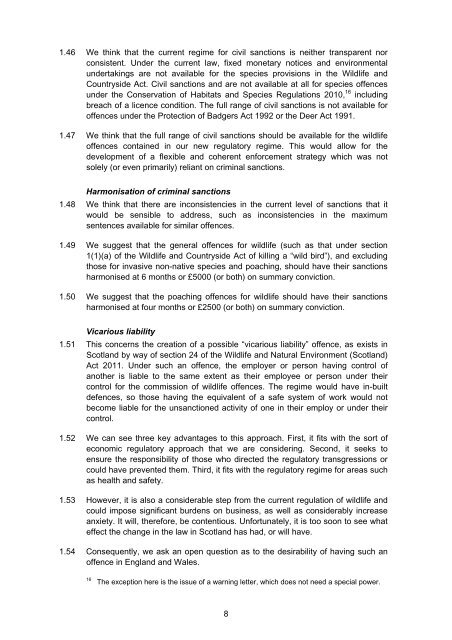Wildlife consultation paper summary - Law Commission
Wildlife consultation paper summary - Law Commission
Wildlife consultation paper summary - Law Commission
Create successful ePaper yourself
Turn your PDF publications into a flip-book with our unique Google optimized e-Paper software.
1.46 We think that the current regime for civil sanctions is neither transparent nor<br />
consistent. Under the current law, fixed monetary notices and environmental<br />
undertakings are not available for the species provisions in the <strong>Wildlife</strong> and<br />
Countryside Act. Civil sanctions and are not available at all for species offences<br />
under the Conservation of Habitats and Species Regulations 2010, 16 including<br />
breach of a licence condition. The full range of civil sanctions is not available for<br />
offences under the Protection of Badgers Act 1992 or the Deer Act 1991.<br />
1.47 We think that the full range of civil sanctions should be available for the wildlife<br />
offences contained in our new regulatory regime. This would allow for the<br />
development of a flexible and coherent enforcement strategy which was not<br />
solely (or even primarily) reliant on criminal sanctions.<br />
Harmonisation of criminal sanctions<br />
1.48 We think that there are inconsistencies in the current level of sanctions that it<br />
would be sensible to address, such as inconsistencies in the maximum<br />
sentences available for similar offences.<br />
1.49 We suggest that the general offences for wildlife (such as that under section<br />
1(1)(a) of the <strong>Wildlife</strong> and Countryside Act of killing a “wild bird”), and excluding<br />
those for invasive non-native species and poaching, should have their sanctions<br />
harmonised at 6 months or £5000 (or both) on <strong>summary</strong> conviction.<br />
1.50 We suggest that the poaching offences for wildlife should have their sanctions<br />
harmonised at four months or £2500 (or both) on <strong>summary</strong> conviction.<br />
Vicarious liability<br />
1.51 This concerns the creation of a possible “vicarious liability” offence, as exists in<br />
Scotland by way of section 24 of the <strong>Wildlife</strong> and Natural Environment (Scotland)<br />
Act 2011. Under such an offence, the employer or person having control of<br />
another is liable to the same extent as their employee or person under their<br />
control for the commission of wildlife offences. The regime would have in-built<br />
defences, so those having the equivalent of a safe system of work would not<br />
become liable for the unsanctioned activity of one in their employ or under their<br />
control.<br />
1.52 We can see three key advantages to this approach. First, it fits with the sort of<br />
economic regulatory approach that we are considering. Second, it seeks to<br />
ensure the responsibility of those who directed the regulatory transgressions or<br />
could have prevented them. Third, it fits with the regulatory regime for areas such<br />
as health and safety.<br />
1.53 However, it is also a considerable step from the current regulation of wildlife and<br />
could impose significant burdens on business, as well as considerably increase<br />
anxiety. It will, therefore, be contentious. Unfortunately, it is too soon to see what<br />
effect the change in the law in Scotland has had, or will have.<br />
1.54 Consequently, we ask an open question as to the desirability of having such an<br />
offence in England and Wales.<br />
16 The exception here is the issue of a warning letter, which does not need a special power.<br />
8

















